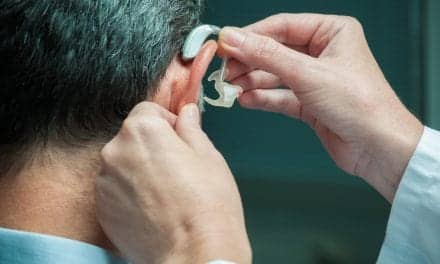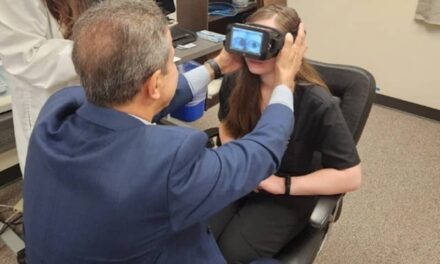New research, commissioned by Australian Hearing, a government-funded hearing aid dispensing company, reveals that the majority of Australians are not aware that untreated hearing loss is associated with some serious health conditions, Australian Hearing announced. In particular, 91% of Australians do not realize there is an association between diabetes and hearing issues.
Hearing loss is a multifaceted issue and can impact both the person experiencing it, as well as their friends and family. In young children, undiagnosed hearing loss can lead to poor language skills and behavioral issues, and in older people it can be associated with depression and cognitive decline.
The majority (61%) of Australians aged over 40 years with hearing loss did not seek help within five years, with 42% among those having serious hearing loss.
Dr Magdalena Simonis, GP and member of the Hearing Health Advisory Panel (HHAP) said, “Hearing loss and diabetes are two of Australia’s most common health concerns and we know that people living with diabetes are twice as likely to suffer hearing loss as those without the condition. The structure of the inner ear is highly vascularized, so any changes to the small blood vessels can lead to hearing loss.”
Australian Hearing has established the Hearing Health Advisory Panel to help address the impact of hearing loss across life stages.
Emma Scanlan, principal audiologist for adults at Australian Hearing and founding member of the HHAP, said, “One in six Australians experiences some level of hearing loss, and that figure is set to increase to one in four over the next 30 years. It’s time for us all to be a part of the solution and to drive much-needed awareness of its potential impact. Hearing loss, particularly when left untreated, can impact a person’s physical and mental health, work, relationships, and family life. A hearing check takes less than five minutes and is available at Australian Hearing centers or at your local GP.”
The Hearing Health Advisory Panel’s top five reasons why you should take action and discuss hearing loss with family and friends this holiday season:
1) So no one misses out simply because of a missed conversation
- Talk to your family about hearing challenges so everyone can enjoy the family reunion. Noisy environments can be very challenging and may stop those who find it difficult from socializing, often without others understanding.
2) To keep enjoying family traditions
- Don’t let hearing loss impact family traditions. Enjoy the traditions together like watching a favorite Christmas movie or listening to carols. Many hearing challenges can be helped if they are discussed; For example, where you sit or being aware of the level of surrounding noise.
3) So the sounds of Christmas can be enjoyed
- Be it hearing the delight of your children, grandchildren, nieces and nephews opening their presents, the BBQ sizzling, or the sound of backyard cricket fun!
4) To give hope to a worried friend or family member
- Discuss the association between hearing loss and overall health as there could be an option to assist and make the new year ahead less challenging or socially isolating.
5) Christmas is often a good time to simply talk
- The support, concern, or interest from a family, friend, or loved one to talk about hearing loss and its challenges cannot be underestimated.
Hearing Health Statistics 1
- 91% of Australians are unaware that there is an association between diabetes and hearing issues.
- 85% of Australians are unaware of the impact of hearing loss on depression.
- 72% of Australians are unaware of the link between poor language development and hearing issues.
- Only 7% of Australians are aware of the link between vision loss and hearing issues.
- 95% of Australians are unaware of the relationship between hearing issues and arthritis.
- 63% of Australians are unaware of the link between middle ear infection and hearing issues.
- One in four Australians have some hearing loss up to the age of 49 years (24%, 18-34 years; 28%, 35-49 years) but then hearing loss increases significantly to 49% among ages 50-64 years.
- 56% of Australians are not aware that tinnitus (ringing or buzzing in ear) is an early warning sign of hearing loss.
- 85% of Australians are not aware of the potential relationship between hearing loss and the typical 7-10 year delay in seeking help about hearing issues
The Hearing Health Advisory Panel represents health professionals and advocacy groups across different disciplines. The panel seeks to collaborate to raise much-needed awareness of the impact of hearing loss on overall health and wellbeing. The Panel’s expertise spans a diverse range of health-related disciplines, encompassing adult and pediatric audiology, general practice, diabetes management, vision loss, and Aboriginal and Torres Strait Islander healthcare.
The Hearing Health Advisory Panel includes (in alphabetical order):
- Elizabeth Beach – Research Psychologist, National Acoustic Laboratories
- Clinical Professor Harvey Coates AO – Otolaryngologist (Subspecialty in Pediatrics), University of Western Australia
- Sturt Eastwood – Chief Executive Officer, Diabetes NSW/ACT
- Alison Fawcett – Practice Nurse, Vitalis Family Medical Practice
- Sam Harkus – Principal Audiologist, Aboriginal and Torres Strait Islander Services, Australian Hearing
- Alison King – Principal Audiologist, Pediatric Services, Australian Hearing
- Associate Professor Catherine McMahon – Researcher, Clinical Audiologist, and Head of Audiology, Macquarie University
- Emma Scanlan – Principal Audiologist Adults, Australian Hearing
- Ros Rose – Nurse Audiometrist, Pius X Aboriginal Corporation
- Dr Magdalena Simonis – General Practitioner, Fellow of the Royal Australian College of General Practitioners, Honorary Research Fellow, Department of General Practice, University of Melbourne Medical School
- Jane Wicks – Regional Manager, Vision Australia
1. Hearing Loss Issues – commissioned by Australian Hearing. Conducted on the Galaxy Online Omnibus between April 20 and April 23, 2017, national sample of 1,000 Australians aged 18 years and older. Data has been weighted by age, gender, and region to reflect the latest ABS population estimates.
Source: Australian Hearing






Every hearing loss, regardless of type, nature, and age of patient, will lead to cognitive changes,. Such changes begin as the mental stress associated with listening tasks increase. Such changes occur as plastic processes get limited in the hippocampus.
Educating the public on the consequences of reduced cognition should be the first priority, and this will help in early understanding of hearing loss. I note that the article does not highlight this impact!
It is very much essential for the people to under go hearing test-AUDIO GRAM once in 6 months so as to take precautionary measures and treatment if found necessary.
Wish for the glorious success of your learned service organisation.
LION. T. NARAYANA SETTY. HKF.
AUDIOLOGIST AND SPEECH THERAPIST
RESOURCE PERSON FOR THE HEARING IMPAIRED